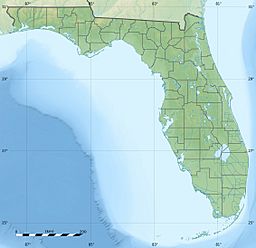Lake Poinsett (Florida) facts for kids
Quick facts for kids Lake Poinsett |
|
|---|---|
| Location | Brevard / Orange / Osceola counties, near Cocoa, Florida, U.S. |
| Coordinates | 28°20′N 80°49′W / 28.333°N 80.817°W |
| Primary inflows | Taylor Creek, St. Johns River |
| Primary outflows | St. Johns River |
| Basin countries | United States |
| Max. length | 2.74 miles (4.41 km) |
| Max. width | 5.43 miles (8.74 km) |
| Surface area | 4,334 acres (18 km2) |
| Surface elevation | 13 feet (4 m) |
| Islands | Various islands and islets |
Lake Poinsett is a large lake located in Brevard County, Florida, United States. Most of the lake is in Brevard County. Smaller parts of it are in Orange County and Osceola County. The lake is near the cities of Rockledge and Cocoa.
Lake Poinsett is the second-largest lake in Brevard County. Only Lake Washington is bigger. However, it is the smallest lake in Osceola County. It is also the widest lake in Brevard County. At its widest point, it measures about 5 miles (8 kilometers) across.
Contents
Lake Poinsett's Location and Water Flow
Lake Poinsett is an important part of the St. Johns River system. All the lakes in this area flow northward. This means water from Lake Poinsett eventually joins the St. Johns River.
The St. Johns River runs along the county lines north of the lake. The lake is managed by the St. Johns River Water Management District. This group helps protect the water and land around the river. At the far northwest side of Lake Poinsett, you will find Taylor Creek. This creek flows into the St. Johns River.
Naming Lake Poinsett
The lake is named after a person named Joel Roberts Poinsett. He was a diplomat from the United States. A diplomat is someone who represents their country in other nations. Joel Roberts Poinsett is famous for bringing the poinsettia plant to the United States. This plant is known for its bright red and green leaves.
Communities Around Lake Poinsett
There are several places and communities near Lake Poinsett. These include the cities of Cocoa and Rockledge. Other nearby areas are Cocoa West and Canaveral Groves.
Poinsett Shores Community
Poinsett Shores and Poinsett Acres are neighborhoods right by Lake Poinsett. They are known as a boating community. This means many people who live there enjoy boating on the lake. These communities are on the northeastern side of Lake Poinsett. They are located at the southern end of Lake Poinsett Road.
WoodMoore Estates is another community near the lake. It is on the east-northeastern shore. Poinsett Shores and Poinsett Acres cover about one and a half square miles.
Environmental Concerns
In July 2002, there was an environmental issue at Lake Poinsett. A very heavy rainstorm occurred. This storm washed a lot of runoff into the lake. Runoff is water that flows over land. This runoff contained phosphorus from lawns and septic tanks.
Phosphorus can be a nutrient, but too much of it can harm a lake. High levels of phosphorus can cause too much algae to grow. This can reduce the oxygen in the water. Sadly, this event led to the death of many fish in the lake. It showed how important it is to protect our lakes from pollution.
 | Toni Morrison |
 | Barack Obama |
 | Martin Luther King Jr. |
 | Ralph Bunche |



